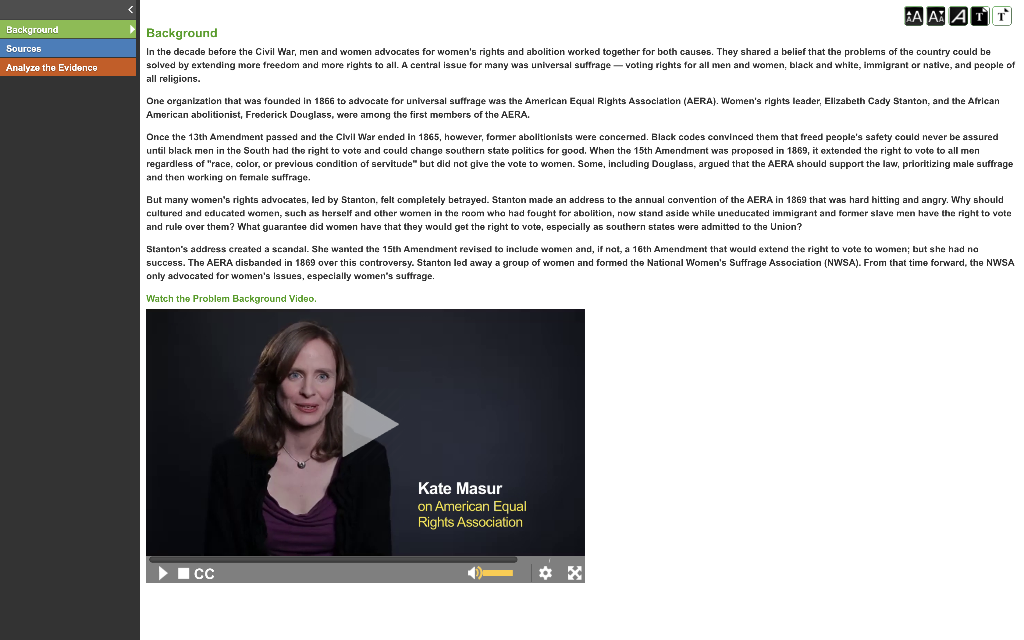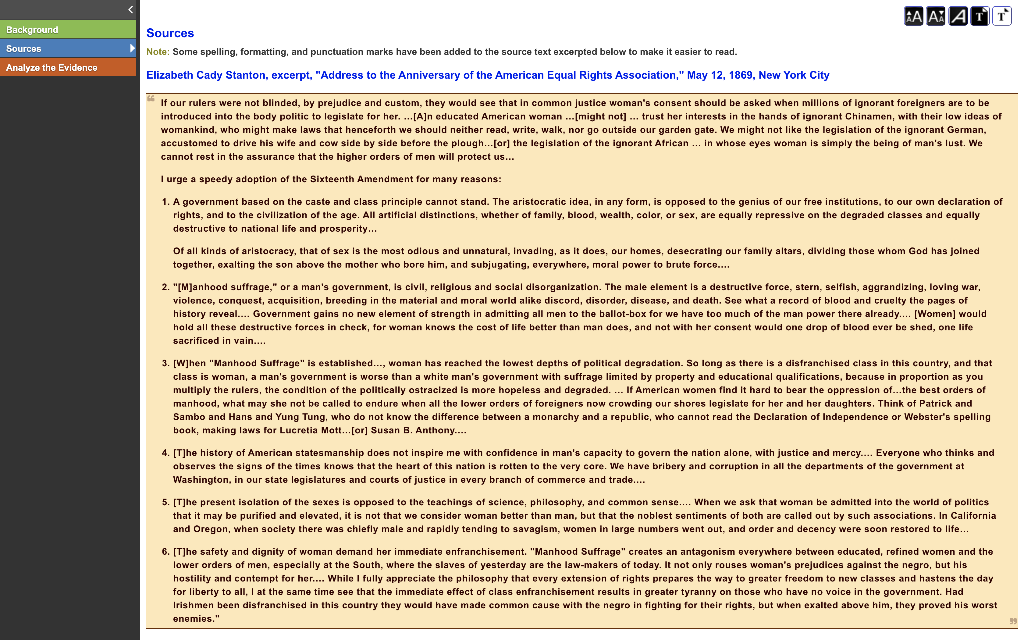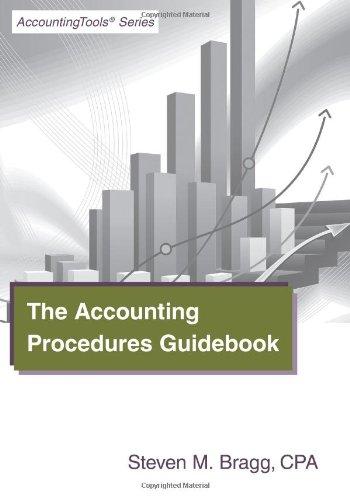



Background Sources Analyze the Evidence AAA ATT Background In the decade before the Civil War, men and women advocates for women's rights and abolition worked together for both causes. They shared a belief that the problems of the country could be solved by extending more freedom and more rights to all. A central issue for many was universal suffrage-voting rights for all men and women, black and white, immigrant or native, and people of all religions. One organization that was founded in 1866 to advocate for universal suffrage was the American Equal Rights Association (AERA). Women's rights leader, Elizabeth Cady Stanton, and the African American abolitionist, Frederick Douglass, were among the first members of the AERA. Once the 13th Amendment passed and the Civil War ended in 1865, however, former abolitionists were concemed. Black codes convinced them that freed people's safety could never be assured until black men in the South had the right to vote and could change southern state politics for good. When the 15th Amendment was proposed 1869, it extended the right to vote to all men regardless of "race, color, or previous condition of servitude" but did not give the vote to women. Some, including Douglass, argued that the AERA should support the law, prioritizing male suffrage and then working on female suffrage. But many women's rights advocates, led by Stanton, felt completely betrayed. Stanton made an address to the annual convention of the AERA in 1869 that was hard hitting and angry. Why should cultured and educated women, such as herself and other women in the room who had fought for abolition, now stand aside while uneducated immigrant and former slave men have the right vote and rule over them? What guarantee did women have that they would get the right to vote, especially as southern states were admitted to the Union? Stanton's address created a scandal. She wanted the 15th Amendment revised to include women and, if not, a 16th Amendment that would extend the right to vote to women; but she had no success. The AERA disbanded 1869 over this controversy. Stanton led away a group of women and formed the National Women's Suffrage Association (NWSA). From that time forward, the NWSA only advocated for women's Issues, especially women's suffrage. Watch the Problem Background Video. Kate Masur on American Equal Rights Association ICC AAAA Background Sources Analyze the Evidence Sources Note: Some spelling, formatting, and punctuation marks have been added to the source text excerpted below to make it easier to read. Elizabeth Cady Stanton, excerpt, "Address to the Anniversary of the American Equal Rights Association," May 12, 1869, New York City If our rulers were not blinded, by prejudice and custom, they would see that in common Justice woman's consent should be asked when millions of ignorant foreigners are to be introduced into the body politic to legislate for her. ...[A]n educated American woman ...[might not] ... trust her interests in the hands of ignorant Chinamen, with their low ideas of womankind, who might make laws that henceforth we should neither read, write, walk, nor go outside our garden gate. We might not like the legislation of the ignorant German, accustomed to drive his wife and cow side by side before the plough...[or] the legislation of the ignorant African ... in whose eyes woman is simply the being of man's lust. We cannot rest in the assurance that the higher orders of men will protect us... I urge a speedy adoption of the Sixteenth Amendment for many reasons: 1. A government based on the caste and class principle cannot stand. The aristocratic idea, in any form, is opposed to the genius of our free institutions, to our own declaration of rights, and to the civilization of the age. All artificial distinctions, whether of family, blood, wealth, color, or sex, are equally repressive on the degraded classes and equally destructive to national life and prosperity... Of all kinds of aristocracy, that of sex is the most odious and unnatural, invading, as it does, our homes, desecrating our family altars, dividing those whom God has joined together, exalting the son above the mother who bore him, and subjugating, everywhere, moral power to brute force.... 2. "[M]anhood suffrage," or a man's government, is clvil, religious and social disorganization. The male element is a destructive force, stern, selfish, aggrandizing, loving war, violence, conquest, acquisition, breeding in the material and moral world alike discord, disorder, disease, and death. See what a record of blood and cruelty the pages of history reveal.... Government gains no new element of strength in admitting all men to the ballot-box for we have too much of the man power there already.... [Women] would hald all these destructive forces in check, for woman knows the cost of life better than man does, and not with her consent would one drop of blood ever be shed, one life sacrificed in vain.... 3. [W]hen "Manhood Suffrage" is established..., woman has reached the lowest depths of political degradation. So long as there is a disfranchised class in this country, and that class is woman, a man's government is worse than a white man's government with suffrage limited by property and educational qualifications, because in proportion as you multiply the rulers, the condition of the politically ostracized is more hopeless and degraded. ... If American women find it hard to bear the oppression of...the best orders of manhood, what may she not be called to endure when all the lower orders of foreigners now crowding our shores legislate for her and her daughters. Think of Patrick and Sambo and Hans and Yung Tung, who do not know the difference between a monarchy and a republic, who cannot read the Declaration of Independence or Webster's spelling book, making laws for Lucretia Mott... [or] Susan B. Anthony.... 4. [T]he history of American statesmanship does not inspire me with confidence in man's capacity to govern the nation alone, with justice and mercy.... Everyone who thinks and observes the signs of the times knows that the heart of this nation is rotten to the very care. We have bribery and corruption in all the departments of the government at Washington, in our state legislatures and courts of justice in every branch of commerce and trade.... 5. [T]he present isolation of the sexes is opposed to the teachings of science, philosophy, and common sense.... When we ask that woman be admitted into the world of politics that it may be purified and elevated, it is not that we consider woman better than man, but that the noblest sentiments of both are called out by such associations. In California and Oregon, when society there was chlefly male and rapidly tending to savagism, women in large numbers went out, and order and decency were soon restored to life.. 6. [T]he safety and dignity of woman demand her immediate enfranchisement. "Manhood Suffrage" creates an antagonism everywhere between educated, refined women and the lower orders of men, especially at the South, where the slaves of yesterday are the law-makers of today. It not only rouses woman's prejudices against the negro, but his hostility and contempt for her.... While I fully appreciate the philosophy that every extension of rights prepares the way to greater freedom to new classes and hastens the day for liberty to all, I at the same time see that the immediate effect of class enfranchisement results in greater tyranny on those who have no voice in the government. Had Irishmen been disfranchised in this country they would have made common cause with the negro in fighting for their rights, but when exalted above him, they proved his worst enemies." Analyze the Evidence Questions How defensible is the position of Stanton in light of the circumstances of the Reconstruction years? Your professor will divide the class into groups for and against Stanton's positions in her address to the AERA annual meeting in 1869. Read the excerpt from the speech. You will be arguing the following: Resolution: Democracy is most likely to prosper when the franchise is extended to people who are well informed and well educated no matter what their race, gender, ethnicity, or creed. Using the information from the essay and other knowledge you may have of the time, develop a character for yourself who would be living in 1869 and attended or heard about Stanton's speech. Fill out the Character Profile below. List 3 arguments for or against the resolution from your character's perspective on the Debate Arguments Chart. In the Support column, cite information and quotations from Stanton's speech. Discuss your evidence with other students in your group in class. Select the 2 BEST arguments that you believe would persuade others at the time. Share the arguments in class. Your professor will decide which arguments have the most merit. Remember you can choose emotional or logical arguments, but logical arguments probably are most persuasive in the end. Nam Character Dute of Birth Place of Birth Place of Residence Ethnicity Laundr Religion Occupation Family Hisinry Personal History Obat Arguments Chart Support Ethnicity Gender Religion Occupation Family Hiwinry Personal History Background Sources Analyze the Evidence AAA ATT Background In the decade before the Civil War, men and women advocates for women's rights and abolition worked together for both causes. They shared a belief that the problems of the country could be solved by extending more freedom and more rights to all. A central issue for many was universal suffrage-voting rights for all men and women, black and white, immigrant or native, and people of all religions. One organization that was founded in 1866 to advocate for universal suffrage was the American Equal Rights Association (AERA). Women's rights leader, Elizabeth Cady Stanton, and the African American abolitionist, Frederick Douglass, were among the first members of the AERA. Once the 13th Amendment passed and the Civil War ended in 1865, however, former abolitionists were concemed. Black codes convinced them that freed people's safety could never be assured until black men in the South had the right to vote and could change southern state politics for good. When the 15th Amendment was proposed 1869, it extended the right to vote to all men regardless of "race, color, or previous condition of servitude" but did not give the vote to women. Some, including Douglass, argued that the AERA should support the law, prioritizing male suffrage and then working on female suffrage. But many women's rights advocates, led by Stanton, felt completely betrayed. Stanton made an address to the annual convention of the AERA in 1869 that was hard hitting and angry. Why should cultured and educated women, such as herself and other women in the room who had fought for abolition, now stand aside while uneducated immigrant and former slave men have the right vote and rule over them? What guarantee did women have that they would get the right to vote, especially as southern states were admitted to the Union? Stanton's address created a scandal. She wanted the 15th Amendment revised to include women and, if not, a 16th Amendment that would extend the right to vote to women; but she had no success. The AERA disbanded 1869 over this controversy. Stanton led away a group of women and formed the National Women's Suffrage Association (NWSA). From that time forward, the NWSA only advocated for women's Issues, especially women's suffrage. Watch the Problem Background Video. Kate Masur on American Equal Rights Association ICC AAAA Background Sources Analyze the Evidence Sources Note: Some spelling, formatting, and punctuation marks have been added to the source text excerpted below to make it easier to read. Elizabeth Cady Stanton, excerpt, "Address to the Anniversary of the American Equal Rights Association," May 12, 1869, New York City If our rulers were not blinded, by prejudice and custom, they would see that in common Justice woman's consent should be asked when millions of ignorant foreigners are to be introduced into the body politic to legislate for her. ...[A]n educated American woman ...[might not] ... trust her interests in the hands of ignorant Chinamen, with their low ideas of womankind, who might make laws that henceforth we should neither read, write, walk, nor go outside our garden gate. We might not like the legislation of the ignorant German, accustomed to drive his wife and cow side by side before the plough...[or] the legislation of the ignorant African ... in whose eyes woman is simply the being of man's lust. We cannot rest in the assurance that the higher orders of men will protect us... I urge a speedy adoption of the Sixteenth Amendment for many reasons: 1. A government based on the caste and class principle cannot stand. The aristocratic idea, in any form, is opposed to the genius of our free institutions, to our own declaration of rights, and to the civilization of the age. All artificial distinctions, whether of family, blood, wealth, color, or sex, are equally repressive on the degraded classes and equally destructive to national life and prosperity... Of all kinds of aristocracy, that of sex is the most odious and unnatural, invading, as it does, our homes, desecrating our family altars, dividing those whom God has joined together, exalting the son above the mother who bore him, and subjugating, everywhere, moral power to brute force.... 2. "[M]anhood suffrage," or a man's government, is clvil, religious and social disorganization. The male element is a destructive force, stern, selfish, aggrandizing, loving war, violence, conquest, acquisition, breeding in the material and moral world alike discord, disorder, disease, and death. See what a record of blood and cruelty the pages of history reveal.... Government gains no new element of strength in admitting all men to the ballot-box for we have too much of the man power there already.... [Women] would hald all these destructive forces in check, for woman knows the cost of life better than man does, and not with her consent would one drop of blood ever be shed, one life sacrificed in vain.... 3. [W]hen "Manhood Suffrage" is established..., woman has reached the lowest depths of political degradation. So long as there is a disfranchised class in this country, and that class is woman, a man's government is worse than a white man's government with suffrage limited by property and educational qualifications, because in proportion as you multiply the rulers, the condition of the politically ostracized is more hopeless and degraded. ... If American women find it hard to bear the oppression of...the best orders of manhood, what may she not be called to endure when all the lower orders of foreigners now crowding our shores legislate for her and her daughters. Think of Patrick and Sambo and Hans and Yung Tung, who do not know the difference between a monarchy and a republic, who cannot read the Declaration of Independence or Webster's spelling book, making laws for Lucretia Mott... [or] Susan B. Anthony.... 4. [T]he history of American statesmanship does not inspire me with confidence in man's capacity to govern the nation alone, with justice and mercy.... Everyone who thinks and observes the signs of the times knows that the heart of this nation is rotten to the very care. We have bribery and corruption in all the departments of the government at Washington, in our state legislatures and courts of justice in every branch of commerce and trade.... 5. [T]he present isolation of the sexes is opposed to the teachings of science, philosophy, and common sense.... When we ask that woman be admitted into the world of politics that it may be purified and elevated, it is not that we consider woman better than man, but that the noblest sentiments of both are called out by such associations. In California and Oregon, when society there was chlefly male and rapidly tending to savagism, women in large numbers went out, and order and decency were soon restored to life.. 6. [T]he safety and dignity of woman demand her immediate enfranchisement. "Manhood Suffrage" creates an antagonism everywhere between educated, refined women and the lower orders of men, especially at the South, where the slaves of yesterday are the law-makers of today. It not only rouses woman's prejudices against the negro, but his hostility and contempt for her.... While I fully appreciate the philosophy that every extension of rights prepares the way to greater freedom to new classes and hastens the day for liberty to all, I at the same time see that the immediate effect of class enfranchisement results in greater tyranny on those who have no voice in the government. Had Irishmen been disfranchised in this country they would have made common cause with the negro in fighting for their rights, but when exalted above him, they proved his worst enemies." Analyze the Evidence Questions How defensible is the position of Stanton in light of the circumstances of the Reconstruction years? Your professor will divide the class into groups for and against Stanton's positions in her address to the AERA annual meeting in 1869. Read the excerpt from the speech. You will be arguing the following: Resolution: Democracy is most likely to prosper when the franchise is extended to people who are well informed and well educated no matter what their race, gender, ethnicity, or creed. Using the information from the essay and other knowledge you may have of the time, develop a character for yourself who would be living in 1869 and attended or heard about Stanton's speech. Fill out the Character Profile below. List 3 arguments for or against the resolution from your character's perspective on the Debate Arguments Chart. In the Support column, cite information and quotations from Stanton's speech. Discuss your evidence with other students in your group in class. Select the 2 BEST arguments that you believe would persuade others at the time. Share the arguments in class. Your professor will decide which arguments have the most merit. Remember you can choose emotional or logical arguments, but logical arguments probably are most persuasive in the end. Nam Character Dute of Birth Place of Birth Place of Residence Ethnicity Laundr Religion Occupation Family Hisinry Personal History Obat Arguments Chart Support Ethnicity Gender Religion Occupation Family Hiwinry Personal History










